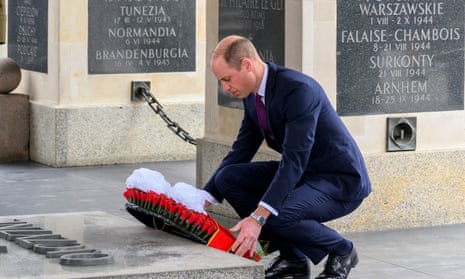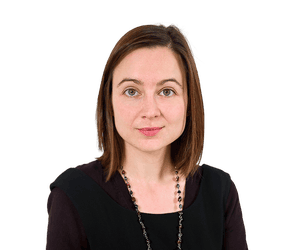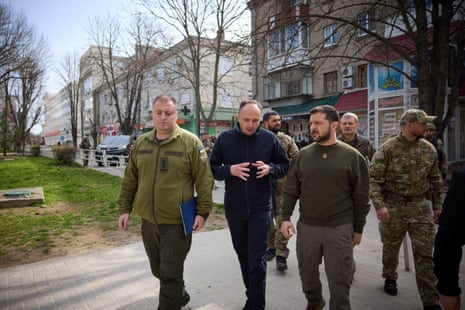We’re closing this blog down now. Thanks for reading. Here’s a summary of the day’s main events:
Volodymyr Zelenskiy has renewed his call for more long-range weapons from western allies, as he addressed EU leaders meeting in Brussels. Speaking to the EU summit via video link, the Ukrainian president’s account of the “devastating” scenes he had witnessed where the fighting has been fiercest was said to be emotional and to have had a big impact on the 27 EU leaders and top officials in Brussels listening to him.
Russian leaders should be put on trial for the invasion of Ukraine even if they cannot be arrested and brought to court in person, Kyiv’s top prosecutor said. Gen Andriy Kostin said a planned tribunal for the crime of aggression should hold so-called trials in absentia.
Dmitry Medvedev, the deputy secretary of Russia’s Putin-chaired security council, said Moscow’s relations with the west have hit an all-time low. Asked whether the threat of a nuclear conflict has eased, he said: “No, it hasn’t decreased, it has grown. Every day when they provide Ukraine with foreign weapons brings the nuclear apocalypse closer.”
Finland’s president, Sauli Niinistö, signed legislation to make his country part of the North Atlantic Treaty Organisation (Nato). Last year, Finland sought to join the military alliance in response to Russia’s war in Ukraine, and legislation incorporating Nato’s founding treaties was passed in parliament in Helsinki on 1 March.
The UN nuclear agency’s chief said that the situation at Ukraine’s Zaporizhzhia power plant “remains perilous” after a Russian missile strike this month disconnected the plant from the grid. Europe’s largest nuclear power plant needs a reliable electricity supply to operate pumps that circulate water to cool reactors and pools holding nuclear fuel.
Ukraine’s state emergency service said on Thursday that it had ended rescue attempts in Rzhyshchiv, Kyiv region, where it is now known that nine people died in a suspected Russian drone attack in the early hours of Wednesday morning.
Suspilne, Ukraine’s state broadcaster, reported that on Wednesday shelling in the Donetsk region killed two people and injured four others, while one person was killed and two were wounded in the Kherson region.
Gen Oleksandr Syrskyi, commander of the Ukrainian ground forces, said: “The aggressor does not give up hope of taking Bakhmut at any cost, despite the losses in manpower and equipment.” He added that Russia was losing “considerable strength” and that “very soon we will take advantage of this opportunity, as we once did near Kyiv, Kharkiv, Balakliia and Kupiansk”, all areas that Ukraine has previously liberated from Russian occupation.
The UK Ministry of Defence said that “Russia has made gains of up to several kilometres” in the Luhansk region, and that “Russian commanders are likely trying to expand a security zone west from the defence lines they have prepared along higher ground, and integrate the natural obstacle of the Oskil River. They likely seek to recapture Kupiansk, a logistics node.”
Any attempt to arrest Vladimir Putin after the international criminal court (ICC) issued a warrant for the Kremlin chief would amount to a declaration of war against Russia, his ally Dmitry Medvedev said on Thursday, while directly threatening to attack the seat of any government that allowed it to happen.
A video is circulating on social media of the Ukrainian national flag flying from a tall mast in Crimea, a region annexed by Russia in 2014. It appears to have been filmed near the village of Hrushivka.
Spain’s prime minister, Pedro Sánchez, said on Thursday he would discuss a peace plan for Ukraine with the Chinese president, Xi Jinping, during an official visit to China next week.
Estonia’s prime minister, Kaja Kallas, on Thursday spoke against any weakening of sanctions against Russia under a deal to export Ukrainian grain through the Black Sea, and called for the G7 to tighten its oil cap to squeeze Russia’s revenue more.
A former New Zealand soldier who drew an online following with his dispatches from the frontline of the Ukraine war has been killed. The death of Kane Te Tai, 38, was confirmed by New Zealand’s foreign ministry Thursday, citing Ukrainian government sources. Te Tai, who fought with the International Legion, is the third New Zealander known to have died in Ukraine.
Ukraine’s military has now withdrawn its claim Russian troops had left Nova Kahkovka.
The general staff of the Ukrainian armed forces, in a rare retraction, said Russian troops remained in the town on the east bank of the Dnipro River. It said the initial report had been issued “as a result of incorrect use of available data” but gave no details.
Vladimir Saldo, the Russian-installed governor of Kherson region, had denied the report.
The EU has denounced Russian police raids against the Nobel prize-winning human rights group Memorial, describing them as being part of an intimidation and harassment campaign.
Reuters, citing Memorial, reports that Russian security forces raided the homes of former employees of the group on Tuesday and took some of them in for questioning.
Founded to document political repression in the Soviet Union, Memorial was officially banned in late 2021 after the authorities claimed it supported terrorism and extremism, charges the group called absurd. The spokesperson for the EU foreign policy chief, Josep Borrell, Peter Stano, said:
The recent actions by the Russian authorities constitute yet another step in the ongoing intimidation and persecution of independent and critical voices in the Russian society.
Memorial’s work in Russia has been invaluable in defence of human rights and against “attempts to manipulate the historical memory of political repression in Russia in the 20th century”, he added.
The EU calls upon the Russian authorities to stop the unfounded prosecution and police harassment of Memorial and its staff – and to respect the rule of law.
Tuesday’s raids were carried out after Russian investigators accused the now dissolved group of allegedly including the names of second world war-era Nazi collaborators on their historical list of victims of political terror.
The raids were condemned by rights groups internationally as well as what remains of Russia’s domestic opposition, Reuters reports.
We reported earlier that the Ukrainian military was claiming Russian forces had left the town of Nova Kakhovka in the southern Kherson region. Vladimir Saldo, the Russian-installed governor of Kherson region, has denied that. Reuters quotes him as saying on Telegram:
All Russian military personnel in Nova Kakhovka, as well as in other locations on the left (eastern) bank of the Dnipro remain in their place.
Russian forces redeployed to the east bank of the Dnipro River last November after abandoning positions on the west bank in the face of a counteroffensive by Ukrainian troops.
Russian athletes will remain barred from track and field “for the foreseeable future” because of the country’s invasion of Ukraine, the World Athletics president, Sebastian Coe, has said.
The International Olympic Committee is exploring a pathway for Russian and Belarusian athletes to compete as neutrals at next year’s Olympic Games in Paris. But it appears likely they will not be able to feature in athletics in Paris, arguably the highest-profile Olympic sport. Lord Coe told a press conference:
The World Athletics Council approved to continue to exclude Russian and Belarus athletes from all World Series events for the foreseeable future due to the invasion and ongoing war in Ukraine.
Russian forces have left the town of Nova Kakhovka in the southern Kherson region, the Ukrainian military’s general staff has said.
Reuters quotes its evening report outlining conditions on the front lines as saying:
As of 22 March 2023, all units of the occupying army that had been deployed in the town of Nova Kakhovka in Kherson region, have left the city.
The town is located on the east bank of the Dnipro River, where Russian forces redeployed last November after abandoning positions on the west bank in the face of a counter-offensive by Ukrainian troops.
The report said Russian troops had stolen appliances, valuables, clothing and mobile telephones from nearby houses as they departed.
Finland rubber-stamps legislation allowing it to join Nato
Finland’s president, Sauli Niinistö, has signed legislation to make his country part of the North Atlantic Treaty Organisation (Nato) during a ceremony on Thursday.
Last year, Finland sought to join the military alliance in response to Russia’s war in Ukraine, and legislation incorporating Nato’s founding treaties was passed in parliament in Helsinki on 1 March.
Hungary and Turkey, the only Nato members that have yet to ratify Finland’s membership, have both signalled they will soon do so.
European Union leaders have held talks with the UN chief, António Guterres, on sanctions imposed on Russia and are also expected to endorse a plan to supply more artillery shells to Kyiv.
Reuters reports that Guterres’ participation in the EU summit, where global food security was also discussed, comes days after the renewal of a deal brokered by the United Nations and Turkey on the safe export of Ukrainian grain via the Black Sea that is seen as crucial to overcoming a global food crisis.
The 27 EU leaders were also due to get an update on the war from the Ukrainian president, Volodymyr Zelenskiy, via video link. Arriving for the two-day summit, the German chancellor, Olaf Scholz, said:
We need to ensure that grain exports, for example from Ukraine, can continue.
The Estonian prime minister, Kaja Kallas, spoke against any easing of sanctions on Moscow under the grain deal and called for a tighter price cap on Russian oil exports.
The US has pushed back against Russian demands that western sanctions be eased before Moscow allows Ukrainian Black Sea grain exports to continue beyond mid-May, saying there are no restrictions on Russian farm products or fertilisers.
Inside the EU, the issue of fertiliser exports is blocking more sanctions against Russia’s ally Belarus. The bloc says new sanctions are needed to stop Belarus from serving as a route to bypass the existing Russia trade restrictions.
But Lithuania opposes what it calls “fertiliser oligarch” exemptions proposed to ensure Belarusian fertilisers continue flowing to third countries, arguing that that would weaken the sanctions regime overall, diplomats said.
Proponents say such carve-outs, similar to those the EU has in place under its sanctions against Russia, are necessary to ensure food security and refute Moscow’s charge that EU measures – rather than Russia’s invasion – are driving the global crisis.
Diplomats involved in preparing the summit were sceptical of any imminent breakthrough.
Earlier, William met Poland’s president, Andrzej Duda, at the presidential palace, where they discussed the war in Ukraine. The former’s spokesperson said:
The conversation was warm and friendly, and predominantly focused on the ongoing conflict with the war in Ukraine, particularly its impact on Polish society.
The Prince of Wales took the opportunity to thank the president and the Polish people who have done so much to support the people of Ukraine who’ve fled here. They discussed the importance of the need for ongoing support to Ukraine and its people.
The prince said he was very much looking forward to seeing the president and first lady at the coronation. He also thanked him for attending the late queen’s funeral.
William also echoed his grandmother the queen by laying a wreath at a monument dedicated to soldiers. Queen Elizabeth II and the late Duke of Edinburgh did the same during their state visit to Poland in 1996.
William was greeted by a guard of honour and carried the assortment of flowers to the monument, spending around 10 minutes there before leaving. On the wreath was a note reading: “In memory of those who made the ultimate sacrifice.”

The Prince of Wales has praised the resilience of young Ukrainian refugees living in Poland.
William, on the second day of his surprise trip to the country, visited the Hala Koszyki food hall in Warsaw to speak to those who have fled Ukraine. He joined them at tables on Thursday afternoon and heard about their experiences settling into Polish life. William told them:
It must be very difficult to start an entire new life in a new country. It’s amazing how resilient you are. That shines out.
He also spoke to people who have hosted refugees, and thanked them for their kindness. William was greeted by well-wishers outside the venue and given flowers. Three women held a sign thanking him for the visit.
One of them, Olga Mieszejewska-Buchalik, who travelled three hours from south Poland, told reporters:
I said that we really appreciated his support for our nation and Ukraine.
Vonya Bultruski, 26, who spoke to the prince, told the PA news agency:
I told him how much his support for refugees means, he’s a very kind man. I’m very happy to see him in Poland, it is a big moment for my country.
Marta Galinska, 47, a milliner, gave William a pink felt hat she made for the Princess of Wales.
Zelenskiy renews long-range weapon call in EU summit address

Jennifer Rankin reports for the Guardian from Brussels:
Volodymyr Zelenskiy has renewed his call for more long-range weapons from western allies, as he addressed EU leaders meeting in Brussels.
The Ukrainian president was speaking to the EU summit via video link, from a moving train in an undisclosed location in Ukraine, where he recounted news from the frontline. On Wednesday, Zelenskiy visited frontline military positions near the besieged city of Bakhmut, where he met Ukrainian serviceman and held a moment of silence for those killed in the war. Earlier today he was in Kherson region.
His account of the “devastating” scenes he had witnessed was said to be emotional and to have had a big impact on the 27 EU leaders and top officials in Brussels listening to him. On one occasion the secure line cut out, but was soon reconnected.
According to an EU source, he warned European leaders of five factors that could prolong the war, including delays in the delivery of long-range missiles, lack of modern aircraft and weaknesses in western sanctions.
EU leaders are now discussing the Russian invasion, where they are expected to endorse a decision to supply a million rounds of ammunition to Ukraine within the next 12 months to replenish its dwindling stocks.
Suspilne, Ukraine's state broadcaster, has this report from Kherson on its official Telegram channel, citing the state emergency department:
Four fires broke out in the Kherson region during the day as a result of shelling by the Russian army. A warehouse was on fire in Kherson, a car and the remains of a cable caught fire in Beryslav. And in Antonivka, a private house and a non-residential building were on fire.
The office of Ukraine’s president, Volodymyr Zelenskiy, have issued a couple of photographs of his visit to Kherson region today.


It is Zelenskiy’s second trip outside Kyiv this week, having visited the frontline city of Bakhmut yesterday.
Russia’s president, Vladimir Putin, visited the occupied city of Mariupol on Saturday evening in his first trip to one of the areas that Russia has claimed to annex from Ukraine.

0 Comments